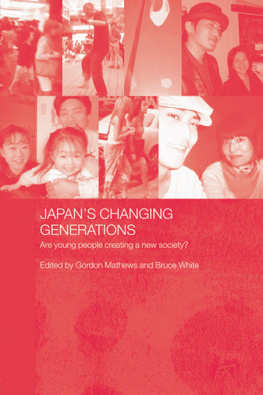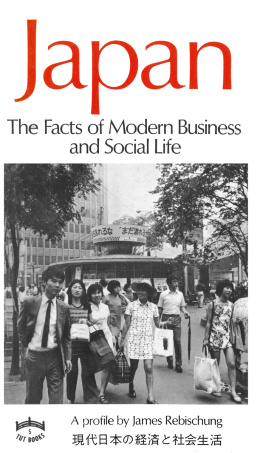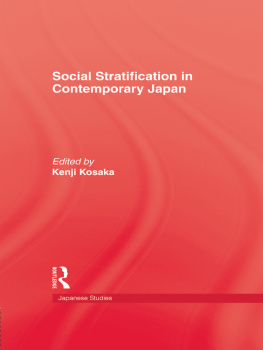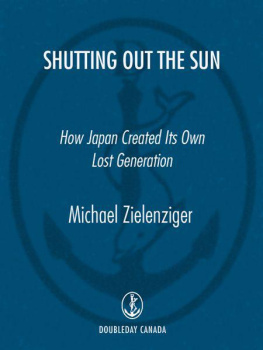Japans Changing Generations
Generations of young people in Japan have resisted the adult social order for the past fifty years; but for the most part, these young people grew up and entered that order. Today, however, in an era in which the Japanese social order has lost legitimacy, this may no longer be the case. Will Japanese young people today be swallowed up by the adult social order, or will they create a new social order, more flexible and pluralistic than that of their elders? In examining this question from many different angles, this book provides a generational roadmap into Japans future.
Gordon Mathews is Associate Professor, Department of Anthropology, the Chinese University of Hong Kong.
Bruce White is Social Anthropologist, an active member of the Europe-Japan Research Centre and part-time Lecturer, Oxford Brookes University.
Japan Anthropology Workshop Series
Series editor: Joy Hendry
Oxford Brookes University
Editorial board:
Pamela Asquith, University of Alberta
Eyal Ben Ari, Hebrew University of Jerusalem
Hirochika Nakamaki, National Museum of Ethnology, Osaka
Wendy Smith, Monash University
Jan van Bremen, University of Leiden
A Japanese View of Nature
The world of living things by Kinji Imanichi
Translated by Pamela J. Asquith, Heita Kawakatsu, Shusuke Yagi and
Hiroyuki Takasaki
Edited and introduced by Pamela J. Asquith
Japans Changing Generations
Are young people creating a new society?
Edited by Gordon Mathews and Bruce White
Japans Changing Generations
Are young people creating a new society?
Edited by Gordon Mathews and
Bruce White
First published 2004
by RoutledgeCurzon
11 New Fetter Lane, London EC4P 4EE
Simultaneously published in the USA and Canada
by RoutledgeCurzon
29 West 35th Street, New York, NY 10001
This edition published in the Taylor & Francis e-Library, 2004.
RoutledgeCurzon is an imprint of the Taylor & Francis Group
2004 Editorial matter and selection, Gordon Mathews and Bruce White; individual chapters, the contributors
All rights reserved. No part of this book may be reprinted or reproduced or utilized in any form or by any electronic, mechanical, or other means, now known or hereafter invented, including photocopying and recording, or in any information storage or retrieval system, without permission in writing from the publishers.
British Library Cataloguing in Publication Data
A catalogue record for this book is available from the British Library
Library of Congress Cataloging in Publication Data
A catalog record for this book has been requested
ISBN 0-203-31662-2 Master e-book ISBN
ISBN 0-203-38703-1 (Adobe eReader Format)
ISBN 0415322278 (Print Edition)
Contents
PART I
The Japanese generational divide
PART II
How teenagers cope with the adult world
PART III
How young adults challenge the social order
Contributors
Peter Ackermann is Chair, Department of Japanology, University of Erlangen-Nrnberg, Germany. He is the author of many articles and book chapters on the Japanese education industry, and on the structure of self and communication in Japan.
Satoshi Kotani is Associate Professor at tsuma University, Tokyo, and author of the books Wakamonoron o yomu [Reading theories about youth] (1993) and Wakamonotachi no henb: sedai o meguru shakaigakuteki monogatari [Changing youth: a sociological narrative about the generations] (1998).
Brian J. McVeigh teaches in the Department of East Asian Studies, University of Arizona. He is the author of many books, including Nationalisms of Japan: Managing and Mystifying Identity (forthcoming), The Nature of the Japanese State (1998), Wearing Ideology: State, Schooling and Self-Presentation in Japan (2000), and Japanese Higher Education as Myth (2002).
Gordon Mathews is Associate Professor, Department of Anthropology, the Chinese University of Hong Kong. He has written What Makes Life Worth Living? How Japanese and Americans Make Sense of Their Worlds (1996) and Global Culture/Individual Identity: Searching for Home in the Cultural Supermarket (2000), and edited Consuming Hong Kong (2001).
Laura Miller is Associate Professor, Department of Sociology and Anthropology, Loyola University Chicago, and is the author of numerous articles on Japanese language and culture, and gender representation in media. She is currently working on a book entitled Beauty Up: The Consumption of Body Aesthetics in Japan.
Shunta Mori is Associate Professor, Department of Regional and Cultural Policy, Shizuoka University of Arts and Culture. He is the author of numerous articles in Japanese on the effects of overseas university experience on Japanese life, as well as on cross-cultural senses of what makes life worth living.
Lynne Nakano is Associate Professor, Department of Japanese Studies, the Chinese University of Hong Kong. She is the author of the forthcoming book Community Volunteers in Japan: Everyday Stories of Social Change.
Tetsuo Sakurai is Professor at Tokyo Keizai University and author of many books, including Kotoba o ushinatta wakamonotachi [Young people who have lost mutual communication] (1985). He has also written the chapter Mondai toshite no wakamono [Youth as a social problem], in Shakaigaku ga wakaru [Understanding sociology] (1997).
Ayumi Sasagawa is the author of the Ph.D. thesis Life Choices: University-Educated Mothers in a Japanese Suburb, Department of Anthropology, Oxford Brookes University.
Moeko Wagatsuma is Research Associate, Department of Japanese Studies, the Chinese University of Hong Kong. She has a Ph.D. in Ethnic Studies from Warwick University, and has done research on single Japanese women in Hong Kong.
Bruce White teaches Anthropology and Intercultural Communication at Oxford Brookes University. There he authored the Ph.D. thesis Local Paths to an Interstate Japan: Charting Generational Change and Identity, in the Department of Anthropology. He is co-founder of the Organisation for Intra-Cultural Development (OICD), an ethnographic research group focusing on identity and social action.
Series editors preface
Members of the Japan Anthropology Workshop continually carry out detailed and insightful research in Japan, and they meet regularly to present papers about their research and to exchange views on the subjects of their study. The fruits of most of these gatherings have eventually appeared in print in a variety of different forms and formats, and we are proud of our collection. However, it sometimes takes several years for our deliberations to be made widely available, and in a country where change flourishes, this is regrettable. The inauguration of a series devoted specifically to the research of the Japan Anthropology Workshop is a step in the direction of speeding up this process, and offering an outlet for groundbreaking work as it proceeds. This book is our first example of success in this respect. The papers were presented at our most recent conference, and the authors have spent the intervening time revising and refining them, so that I think we now have a collection at the cutting edge of research on Japan.











